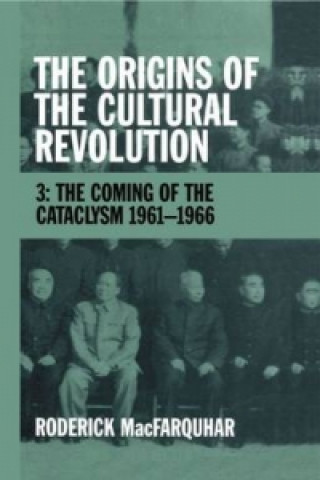
Kézbesítés
Vásárlási tanácsadó





Nem vált be? Semmi gond! Nálunk 30 napon belül visszaküldheti
 Ajándékutalvány
bármilyen értékben
Ajándékutalvány
bármilyen értékben
Ajándékutalvánnyal nem nyúlhat mellé. A megajándékozott az ajándékutalványért bármit választhat kínálatunkból.
Origins of the Cultural Revolution
 Angol
Angol
 440 b
440 b
30 nap a termék visszaküldésére
Ezt is ajánljuk


This is the final volume in a trilogy which examines the politics, personalities, economics, culture, and international relations of China from the mid-1950s to the mid-1960s. Roderick MacFarquhar is the first to use a multitude of new Chinese sources to answer the question: Why did Chairman Mao Zedong launch the Cultural Revolution which plunged China into chaos and almost destroyed its Communist Party? Volume 3 begins with the great famine of the early 1960s which resulted in tens of millions of deaths, setting in train a series of emergency measures which increasingly divided Mao from his comrades-in-arms. The Chairman's anger that they were prepared to adopt 'capitalist' methods to rescue the country was sharpened by his belief that Moscow was denouncing his revolutionary diplomacy because the Soviet leadership had gone capitalist and sold out to the 'imperialist' West. From 1961 to 1966, the increasingly urgent question for Mao was how to prevent a similar revolutionary deterioration in China. The Cultural Revolution, in which tens of thousands of loyal party veterans were publicly disgraced to make way for a supposedly more leftist generation of Red Guards, was his answer. Ironically, after it all ended with Mao's death, one survivor, Deng Xiaoping, was so appalled at the destructiveness of the Chairman's final cataclysm that he actually did turn to capitalism to revive the country. This volume is the first scholarly work for twenty years to focus on the whole gamut of events - political, economic, intellectual, military, and international - in the years leading up to the Cultural Revolution and makes use of a multitude of Chinese documentary, biographical, and historical works that have only appeared in the last decade.
Információ a könyvről
 Angol
Angol




 Hogyan vásároljunk
Hogyan vásároljunk























